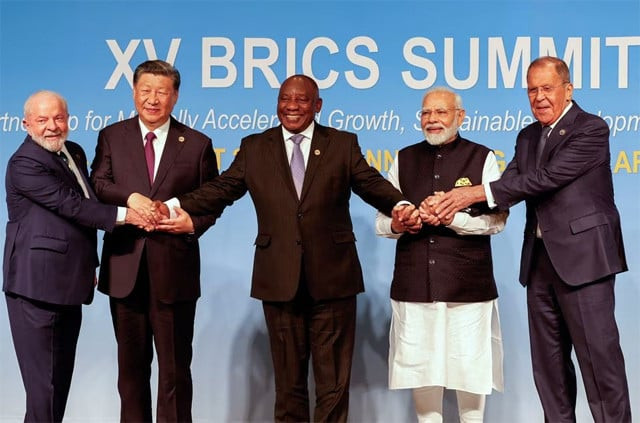The USA is grappling with what Russian President Vladimir Putin described as an 'existential crisis' during discussions about the ongoing Gaza crisis and America's role in it. It is evident that the US is losing ground as a dominant power, especially after the Afghan war, then a policy disappointment in Ukraine, and recently in the Middle East, where its strategies and policies have met with utter failure. Pakistan, sensing the opportunity with the help of vast past experience, is trying to catch this chance of a crumbling but instructive atmosphere. The spokesperson of the Pakistan foreign ministry has confirmed that Pakistan has applied for BRICS membership after the Pakistani envoy to Russia informed Russian media that Pakistan is looking forward to joining BRICS.
There are two different dimensions to consider: what led Pakistan to apply for this, and what outcomes can Pakistan face from its membership? Before moving to these points, it's worth understanding what BRICS is and what it does. BRICS was initially BRIC, comprising Brazil, Russia, India and China, and in 2009, its first summit was held in Russia. Later, in 2010, South Africa was invited to join it, and at the summit of 2011, South Africa participated for the first time and transited into BRICS. It also has the New Development Bank, founded by the BRICS nations, which provides financing for many states. The annual summit of 2023 was held in South Africa in August. The latest meeting of BRICS was held virtually to discuss the Gaza crisis.
There are multiple reasons why Pakistan opted for it. One crucial point to understand is that this is not a sudden decision taken by the caretaker government; Pakistan has been considering this move for a long time. The only thing required was the perfect timing to apply. The recent Gaza crisis provided this opportunity amid the backlash the US is facing globally and its continuous failures in the Middle East, boosting the spirit of Pakistan to take this step of applying for BRICS.
Firstly, in the present circumstances, there are multiple blocs and regional organisations, but many of them are of no importance, like the South Asian Association for Regional Cooperation (SAARC) and the Organisation of Islamic Cooperation (OIC). Interestingly, Pakistan is a member of both of the mentioned platforms. It is true that Pakistan, from the day of its inception, has been an ally of the US. Certain strategic and regional factors paved the way for Pakistan to rely heavily on the US, whether it was the Soviet incursion of Afghanistan in the Zia era or Osama Bin Laden being found in Pakistan by Americans during the Musharraf era. There was always a sense of dependency from both sides; the US needed a base to use, and Pakistan needed economic provisions. However, recently, Pakistan has realised that the US will stand by you only as long as it cannot find an alternative. For instance, during the entire Afghan war, Pakistan was considered an important ally, but as the war ended, so did the US-Pakistan cooperation.
Secondly, Pakistan is considering moving forward with India, and this platform is far better than all others. India is a key player in BRICS, and if it allows Pakistan's inclusion, there is a fair chance that the relationship between both countries can be better. The decision to take Pakistan into BRICS will reflect India's future diplomacy with Pakistan. The issues of Kashmir and other conflicts where stances are more ideological than strategic, and both Pakistan and India will look to stabilise relations with the help of this platform.
Thirdly, Pakistan has observed that its role has become too much like a student who attends class just for the sake of attendance. The recent OIC meeting and then the envoys from different Arab and Muslim countries going across the UN Security Council members, Pakistan was not even considered part of that trip. Being the only Muslim nuclear power and one of the most populated countries in the world, Pakistan deserved better than that.
Fourthly, the dollar's supremacy is in decline, and trade in local currency will become dominant in the next few years. The recent Russia-India oil deal showed how global patterns are changing. Making it worse, the policies of the IMF and the World Bank have wreaked heavy debt on many third-world nations, and today, Pakistan is facing an economic upheaval never witnessed before.
In the larger spectrum for the third world especially, BRICS is attempting to become a choice, if not a replacement, of the US-led western leadership. The US is still far ahead in its economic and local endeavours, but when it comes to where world politics are heading, the US is falling behind. More than 40 countries have shown interest in joining BRICS, while Egypt, Ethiopia, Argentina, Saudi Arabia, the UAE and Iran will be members in 2024. The inclusion of Iran and Saudi Arabia shows that the think tanks in both countries have realised that the future is more dangerous if ideological persistence looms for a long time.
So what does all this mean for Pakistan? The membership will serve Pakistan in two different ways. Firstly, Pakistan will be able to utilise closer ties with BRICS countries. Secondly, Pakistan will be able to exert more pressure or present its case with more authority to western countries, especially the US. In the long run, the membership will facilitate Pakistan working with India, and this is the most important outcome Pakistan and India will both have.



COMMENTS (1)
Comments are moderated and generally will be posted if they are on-topic and not abusive.
For more information, please see our Comments FAQ